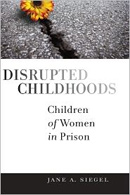Disrupted Childhoods: Children of Women in Prison

Author: Jane A. Siegel
New Brunswick, NJ: Rutgers University Press, 2011. 288p.
Reviewer: Beth E. Adubato | November 2011
Perhaps in an effort not to be sensational, author Jane Siegel gives her book the title “Disrupted Childhoods.” The title belies the truly pernicious nature of the children’s experiences we are about to encounter. Children who move, children whose parents get divorced, children with a seriously-ill family member all have their childhoods disrupted. Children in Siegel’s study, those with incarcerated mothers, have more than disruption— they are exposed to violence, homelessness, drug abuse, poverty, and fragile family structures in addition to the usual problems of growing up. Without mom and almost always without dad, it leaves aunts and uncles, grandparents, and foster parents to piece together a semblance of a childhood for these children. This patchwork nature of parenting produces a fabric interwoven with social ills.
Understatement aside, Siegel has written an excellent book. While feminist criminologists are all too familiar with the concept that the “War on Drugs” is a “War on Women,” for the rest of society, it bears repeating…and explaining. Before Siegel introduces the real life stories from the 159 interviews of children, mothers, and guardians, she includes eye-opening information about the effects of maternal incarceration that would never appear in mainstream media. At the same time, she clearly calls U.S. policymakers to task over incarceration rates and suggests a community-based response to drug offense and addiction. Unfortunately, most policymakers will not read this book, as it is written in an academic style. Students of public policy, however, would be well-served to absorb the lessons in this book; as would those of other social sciences. Additionally, school counselors would glean much understanding of an issue that seldom is brought to light.
Siegel uses the personal stories and first names of the interviewees to illustrate the noxious effect that having an incarcerated mother has on a child. She also readily admits, “Despite the reports of negative outcomes…not all children are equally affected by parental incarceration.” Further, while common knowledge claims that children with incarcerated parents may be “four, five or six times more likely to be imprisoned,” she states that this is not borne out by research. Still, Siegel contends that whether it is “attributable to the direct effect of the parent’s absence, the family environment before…or the child’s circumstances during incarceration, the research makes clear that…millions of children …are at risk of adverse outcomes.”
Utilizing the life-course perspective, Siegel chooses to place incarceration in context with the rest of the child’s life. Consider Terence’s story: His mother, Cynthia, was a heavy drug user. On the day he was born, when she went into labor, she called both an ambulance and her drug dealer. The drug dealer arrived first and when the ambulance driver came through the window of her apartment, she was smoking her pipe and drinking a bottle of vodka, with her newborn baby on top of her stomach. Sixteen years later, Terence was reading at a fifth grade level, living with his older sister, her husband, and their baby because Cynthia was still in jail. Even though his mother had been incarcerated for much of his life, Terence still missed her “terribly.”
Consistently, the interviews showed children with incarcerated mothers exhibiting a profound sadness at their absence—no matter what crimes were committed, how often they had been imprisoned, or how often they had broken promises to their children. As Siegel points out, “Mothers mean security, warmth, and love that children are unable to duplicate elsewhere.” The challenge presented in this book is for researchers and practitioners to find a path to both upholding the law and to insure that these children’s lives are not rent beyond repair.
Beth Adubato is a Visiting Library Fellow at the Rutgers School of Criminal Justice and is a reporter at News 12 New Jersey.


